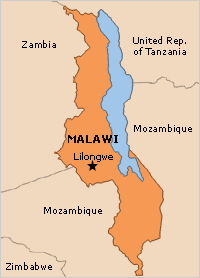Friday, December 02, 2005

Have you heard of Malawi? I hadn't, either, until about twenty minutes ago when
CNN International did a piece on the growing humanitarian crisis in Malawi. So now, hopefully, you're going to learn a little about it. Then I'll ask you for something, which I don't usually do.
The Republic of Malawi is in the southeastern part of Africa. It's slightly under 46,000 square miles in size and has a population of slightly more than 10 million. (Source). In 2004, Malawi reported $503.4 million in exports consisting primarily of tobacco (60%), tea, sugar, cotton, coffee, peanuts, wood products and apparel. Its residents are primarily Protestant and Catholic with the existence also of some tribal regligions. Their official language is English.
Malawi is in crisis and many children are suffering.
The biggest and most pressing issue is that of food - Malawians are in grave danger of dying of hunger. This serious crisis is compounded by a variety of other factors, however. Approximately 400,000 children under age 15 in Malawi have been orphaned by the African AIDS crisis. These children are primarily cared for by relatives who cannot accommodate the economic and resource strain of additional responsibilities. Malawi also severely lacks medical staff and equipment to deal with both emerging and underlying health issues. The AIDS crisis alone has over-strained the system - the disease crisis created by malnutrition further strains the system in Malawi to the point that it is broken.I am a big fan of the ONE Campaign. I even did a post back in August that included the subject of the ONE Campaign. If you're unfamiliar, the ONE Campaign, in part, seeks to hold G-8 leaders accountable and responsible to their adoption of the Millennium Development Goals. Specifically, a commitment was made by all member nations to halve extreme poverty by 2010. Extreme poverty is the underlying cause of the crisis in Malawi. Women and children are the hardest-hit and many, many children will die of simple diseases exacerbated by malnutrition or will die of hunger itself if the international community doesn't respond. We've all heard a lot about "donor fatigue". Last year it was the Tsunami... This year it has been the repeated hurricane damage and disasters. Also in the mix is the Kashmiri earthquake crisis. I know that it's difficult to keep up with who needs what and to have the resources to assist. But I implore you - there are areas of this world that remain largely ignored by Americans simply because they don't know about it. I didn't know about Malawi - but now I do. When I saw the piece on CNN I immediately went to UNICEF and donated some money. If you have any money you can spare - even as little as $5.00 could be the difference between life and death for a child - please, follow the link and help these people.
posted by RenaRF at 12:51 PM
















10 Comments:
You site works great in Firefox now! Good job, what was the fix?
46 square miles? might be a tight squeeze with 10 million of them ;-) It really is a bit of a forgotten nation isn't it, never been there, but a friend did some aid work there, and her photos of the place were amazing.
just stumbled on your blog and enjoyed having a read, thanks.
Btw, just one last suggestion on your site. Well, two ideas, one suggestion. Make your comments a pop-up in new window (in your blogger settings), or install Haloscan for comments. Their site as an automated installer (automatically changes your script for you). It will keep people on your page when they want to comment, and not direct them to another one.
If you go with Haloscan, you also can get rid of the word verify so as not to worry about spammers.
Now, onto your post: Shouldnt the UN be taking this one up, as well as Darfur? I am confused why the United States, or any other sovergn (spelling?) nation is held so accountable for the aid, or lack there off, to other countires, yet we dont demand that the UN, whose sole purpose is "world community", actually act or do anything.
Remember, every time you ask a nation like the US to give money to a struggling nation, that is my (and yours) money you asking the government to give out. And they never ask ME if it is ok.
The government does not have any money of it's own. Governments are merely representitives of people. Did Americans vote to give out their money for the "Millenium Goals?" If not, then I think it is a bit bold to assume that Congress has a right, much less obligation to just toss our money at it.
Michel - thanks for stopping and I fixed the typo. ;-)
G - I'll look into the Haloscan thing. I don't know squat, really, until someone suggest something. ;-) As to the UN, they ARE involved in the entire subject of Africa and they lean heavily on the G-8, given that they comprise the overwhelming majority of wealth on the globe, to take action and do certain things to help the most abject and poverty-stricken countries and regions. The Milennium Development Goals were a UN initiative - they are much more complex than I have referenced - and the entirety of the UN bit off how to deal with poverty in Africa. G-8 countries are critically important simply because they can participate in a soup-to-nuts plan to eliminate poverty. Trade deals. Development deals. Aid packages. Etc. Does that kind of address what you were asking? It is ALL the UN and their goals and commitments America and others made as a result of those goals.
Sadly, I think the world turns a blind eye on the Dark Continent, and they are simply waiting for them to die off. There is little oil, so don't expect massive help from the US. The problem of AIDS is unbelievable. I used to live in Swaziland in the '80s and it really saddens me to think that the HIV rate in that country is something like 33% or higher.
I love Africa. I miss it. I wish I could do more to help.
I guess yes, and no Rena.
Is it a moral obligation of Government, or people to help Africa? Is it in the realm of the UN's authority to lean on a government to aid Africa?
I guess my point is that I think the entire notion of leaning on a "governemnt" for money to help is flawed (in my opinion). I think the focus on something that needs to be pressed into further private funding and support of those charitable orginizations who do this full time.
In my estimation, the US government gives out more money than it ever should. That responsiblity should be on individuals with their own money, and their own decision, not on government, with my money, but not my decision.
And let's not forget (G especially) that "aid" does not have to be monetary. Much of the aid spelled out in various UN initiatives deal with non-monetary types of arrangements - goods, trade, loans, expertise, advice, etc. Your money certainly goes to support that as well, in terms of taxes. USAID (US Agency for International Development) comes to mind. I'm sure I could think of others but I haven't had my coffee yet. :-)
Education is the key. Money will solve little by comparison to education. Except pave the driveways to King's and President's Mansions...
It is just the way it is there.
That being said, when my father worked for CIDA (Canadian International Development Agency) installing fresh well water in rural villages, some Swazi government officials began making demands of bribes and worse. When he left CIDA to start his own business, the threats were worse.
It is difficult to lend aid in some nations, and Swaziland was actually a very friendly and open country to be in!
I completely agree. It's one of our big concerns here in the States as well... We are falling behind in terms of education and that can only mean a slide in economic opportunity and an increase in poverty.
I dont speak in specific terms when talking about the US/aid, especially since about 90% of what the government spends my money on I would disagree with, but that's the beauty of a Representitive Republic.
I think mine is a general argument for the perdigm shift away from demanding government do more, and enable private orginizations to do more. If the time money and efforst spent by various groups trying to lean on the G8 would instead be devoted to the Red Cross, Peace Corps (think they still exist), and other charitable orginizations that are the professionals at it, then much more would be achieved.
When we ask the US government to do it, you are throwing about ten more layers of red tape into the mix, and then on top of it, asking them to essentially spend even more money that the tax payers may have or have not voted for.
Post a Comment
<< Home